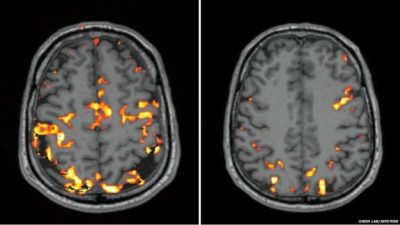Research
Nurses: World’s largest sleep study – how sleep affects brain health
No one’s actually certain as to why human beings need sleep – but any shiftworking nurse or midwife can tell you that going without sleep, or having to sleep at the ‘wrong’ time, is not fun.
Now Canadian neuroscientists have launched the world’s largest sleep study – and you can enrol and participate online.
The BBC’s medical correspondent Fergus Walsh tried out the study, doing online cognitive tests for reasoning, language comprehension and decision-making, joining other volunteers who stayed awake to demonstrate how lack of sleep affects cognitive performance.
After staying up until 04:00, they were allowed four hours sleep and re-did the cognitive tests later in the morning. Fergus scored significantly worse than the night before.
 He also had two MRI scans – the scan on the left shows his brain activity during cognitive tests after a normal night’s sleep, compared with the sleep-deprived brain on the right.
He also had two MRI scans – the scan on the left shows his brain activity during cognitive tests after a normal night’s sleep, compared with the sleep-deprived brain on the right.
Being on night shift doesn’t mean you should give up on the concept of getting enough sleep – you should ensure your sleep environment is welcoming and protected from disturbance and put yourself to bed in a regular, reassuring pattern. Even one extra hour’s sleep can make a difference to your wellbeing.
Here are five things from the BBC’s iWonder guide that you may not know about sleep, which hopefully won’t keep you awake at night (or in the day):
- The longest period without sleep is 11 days and 11 nights, set by Tony Wright of England in 2007.
- Mothers whose babies sleep badly are at greater risk of post-natal depression.
- Older people sleep less deeply and tend to wake after four hours. Newborn babies need around 17 hours, teenagers a good nine hours.
- Lack of sleep has been attributed to several high-profile disasters, including Exxon Valdez, Chernobyl and the Challenger explosion.
- By the time you’re nodding off in your car you’ve already been asleep multiple times at the wheel for two to three seconds.
Participate online in the Canadian Cambridge brain sciences sleep study.
Previously on Nurse Uncut:

Being a professional in MRI I believe sleeping is good for our health. This study might be true about those that usually sleep more than twelve hours a day which is harmful. However, in case sleeping is harming one’s brain health then he or she should consider MRI brain scan right away. There must be some issues with their brain.